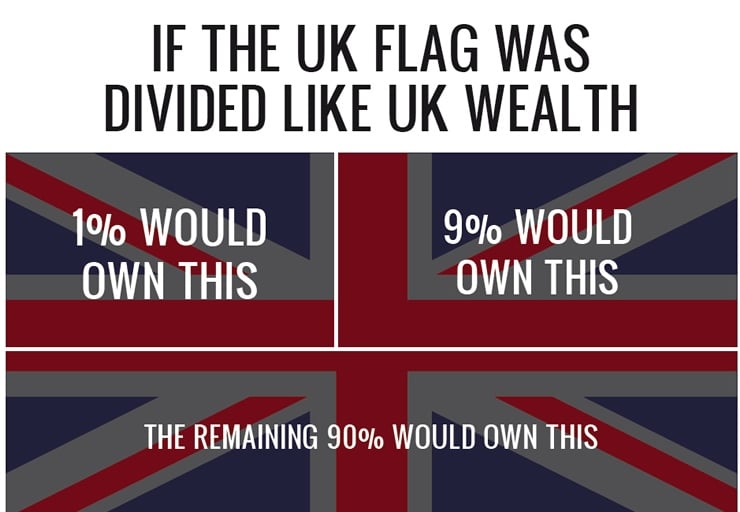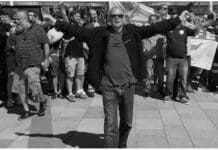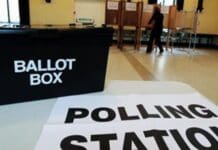Of course, the impact of this instruction, amid the coronavirus pandemic, depends on what your home is like, how many people are rammed into it, and the age and health of those people.
Is the new social divide a split therefore between the park sunbathers and the people who have gardens?
In a tower called Whitstable House in West London, dozens of lives are suspended in 20 floors of concrete.
Coming out the block door this morning was 47-year-old Michael King, pushed out in wheelchair by his sister Clara.
He has an advanced brain tumour and needs daily chemo and radiotherapy. Because of the lockdown he can’t get the home care he needs, so Clara has given up her job as an NHS nurse to look after him.
She is one of 950,000 people who applied Universal Credit in the first fortnight of lockdown, when normally the department for work and pensions would expect 100,000 in that period.
“What we have found is it’s a let-down in the lockdown,” she said.
“Because of the lack of services, we find that we are having to do most of the care for Michael. District Nurses can’t come around. My brother wanted to see a priest, who can’t come around. I’ve had to give up working as a nurse, and it’s very difficult to get any kind of income, so it’s all very isolating and difficult.”
“I feel bad for my colleagues because they’re fighting really hard, you know, and I wish I could be with them, but it’s a risk you know because he’s immunosuppressed.”
COVID-19 doesn’t discriminate between people, but the lockdown does.
Susan Jones lives with her husband and three children, two of whom are autistic, in a one-bedroom flat with no outdoor space. For her, the lockdown is a huge ordeal.
She says: “It’s been tough because we’ve all gotten sick in quite a short period of time.
“I myself am not too well at the moment, I’ve got a few symptoms. The kids are locked indoors, I just feel it’s not okay because staying in such a cramped space and it’s obviously only getting worse, a lot more tantrums than usual. They cope much better when they have outdoor space.”
“It’s quite emotional, and psychologically it’s draining and it’s disrupted the whole routine, and that’s another thing that’s difficult with autism – the children like a set routine and right now we don’t have one.”
The impact of isolation is also difficult for those like Janet Taylor, 77. She lives alone on the 15th floor of Whitstable House, after her husband died last year. Janet has been getting her shopping and her dog walked by Joe Walsh, who lives below her.
But for the first time in two weeks, Janet decided, just once, she was going to the supermarket.
Standing outside the block she said: “I don’t like being shut-in, but it’s a case of having to. I do what I’ve got to do; washing and ironing, and all that kind of stuff, but there’s not much else you can do.”
“I suppose you’ve got to do it, otherwise you end up in hospital and could be dead at the end of it, especially at my age. You know, I don’t fancy that, but there you are.”
You won’t have heard of Whitstable House, the block where Janet, Michael and Joe live, but everyone knows the block next door. Covered in white tarpaulin with a green heart at its top, is what remains of Grenfell Tower.
The tragic fire, which caused 72 deaths, created a strong community spirit in this high-rise enclave, in the way the virus has now done nationwide.
It also sparked questions over social division, and the virus is beginning to do the same. It’s not just about space, the disparity of lockdown is also economic.
People with the kind of jobs that allow them to work from home are not doing their conference calls from blocks like Whitstable House.
The Resolution Foundation believes about half of Britain’s highest-paid employees can be flexible about workplace location, but only 10% of the lower-paid workers can work from home.
So it’s much harder for them to protect their incomes and they have less to fall back on in terms of savings.
Many of the residents of Whitstable House have jobs in the service sector. They are retailers or waiters, and though the government has offered furlough payments of 80% salaries, there is huge uncertainty about whether their jobs will still exist after the lockdown.
The pleas to stay in-doors are important but it is worth remembering the sacrifices and challenges behind each of those doors – and the fallout of the rising government debt and the economic damage could well fall hardest on those who are already struggling the most.
If you like our content, join us in helping to bring reality and decency back by SUBSCRIBING to our Youtube channel: https://www.youtube.com/channel/UCQ1Ll1ylCg8U19AhNl-NoTg AND SUPPORTING US where you can: Award Winning Independent Citizen Media Needs Your Help. PLEASE SUPPORT US FOR JUST £2 A MONTH https://dorseteye.com/donate/













Horse shit.
There’s absolutely no way social & economic inequality can exist under Aunties benevolent nanny state.
Bloody limeys whining over a centrally-planned economic and social dystopia they’ve begged for.
I always was concerned in this subject and still am, thankyou for posting.